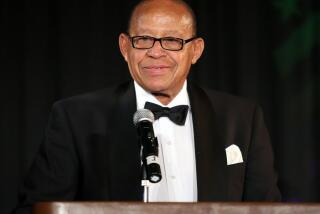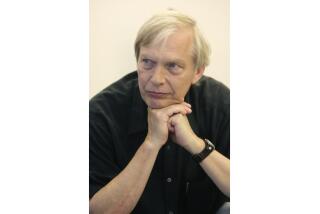W. R. Hearst Jr.; Head of Publishing Empire
- Share via
NEW YORK — William Randolph Hearst Jr., the Pulitzer Prize-winning editor in chief of the Hearst newspapers and an heir to the publishing empire established by his father, died Friday in New York. He was 85.
Hearst, the second of five sons born to William Randolph and Millicent Willson Hearst, found his calling as a reporter and editor. He shared the Pulitzer Prize for international reporting in 1956.
For nearly 40 years he wrote a Sunday editorial column called “Editor’s Report.” He lobbied for a strong defense, pushed for a modern highway system and journeyed the globe to interview world leaders.
He enjoyed friendships with Hollywood stars like John Wayne and Bing Crosby and the camaraderie of New York nightclub life. With Howard Hughes he shared a passion for airplanes and fast cars.
But he kept a lower public profile in the years following the 1974 kidnaping of his niece, Patricia Hearst, who was abducted by a band of radicals in California and wound up taking part in, and standing trial for, a bank robbery.
Hearst sat on the board of trustees of the privately held Hearst Corp. but neither he nor his brothers ever inherited the leadership mantle of their legendary father. That role went to outsiders.
“The old man was a flamboyant editor and publisher. He lived for headlines and national press battles,” Hearst wrote. “I lived in my father’s shadow all my life.”
That long shadow began at the Examiner. Hearst’s grandfather, George Hearst, a wealthy silver miner and California senator, was said to have received the failing paper as partial payment of a poker debt.
In 1887, the senator entrusted the Examiner to Hearst’s father, who turned it around, then went to New York where he bought the Journal and began to challenge Joseph Pulitzer’s World.
As the Hearst newspaper chain grew, so did Hearst senior’s reputation as one of the country’s most controversial media barons. His life served as the model for Orson Welles’ classic movie “Citizen Kane.”
His second son and namesake was born in New York City on Jan. 27, 1908. As a child he split his time between the family’s huge apartment on the West Side and his grandmother’s home in Pleasanton, Calif.
He left the University of California after two years and joined the staff of the New York American, another Hearst paper, starting out as a police reporter. He was made publisher in 1936, a year before two Hearst papers merged to become the Journal-American.
But the title did not carry full authority. He once wrote his father, “I am responsible for this paper, but I can’t very well be if you are communicating your suggestions or orders through half a dozen other people without my knowledge.”
Hearst served as a war correspondent in Europe from 1943 to 1945. Once his father, who also served as his editor, wired him to stop writing about bombing raids until he flew in one. Hearst promptly went up in a B-26.
When he met his father after the war, he recalled, “Pop said I had written some pretty good stuff. I had become a real newspaperman in his eyes. Nothing in the world was more important to me than the old man’s approval.”
Hearst decided he was happier writing than administering. In 1955, four years after his father’s death, he got permission to visit the Soviet Union and took with him colleagues Frank Conniff and Kingsbury Smith.
Through Smith’s persistence, they got exclusive interviews with Foreign Minister V.M. Molotov, Communist party secretary Nikita Khrushchev and others. They turned down an offer to meet Defense Minister Nikolai Bulganin, then scrambled to interview him when he became the premier in a sudden shake-up.
Their articles won wide attention because they gave the first indication of the post-Stalin leadership’s attitude on Allied-Soviet relationships.
The series won a Pulitzer Prize for international reporting--an award established by the senior Hearst’s turn-of-the-century archrival, Joseph Pulitzer.
Editorially, Hearst continued his father’s crusade against Communism and supported Sen. Joseph McCarthy’s red-baiting tactics even when he had been largely discredited and censured.
Hearst was twice divorced before marrying Austine McDonnell, a society gossip columnist, in 1948. The couple had two sons, William Randolph III and Austin. Mrs. Hearst died in June, 1991.
William Randolph Hearst III became publisher of the San Francisco Examiner in 1984 at age 35.
More to Read
Sign up for Essential California
The most important California stories and recommendations in your inbox every morning.
You may occasionally receive promotional content from the Los Angeles Times.










